Why Your Business Needs an Enterprise AI Application: Benefits & Challenges
- BLOG
- Artificial Intelligence
- September 21, 2025
If you’re leading a growing business or enterprise team, you’ve probably felt the pressure to do everything faster and smarter. It’s a lot. You want efficiency without burnout, automation without chaos, and insights that actually help you make better decisions. That’s where an enterprise AI application steps in. From automating repetitive tasks to surfacing real-time insights, enterprise AI can quietly transform how your business runs. In this blog, we will discuss what an enterprise AI application is, its benefits, and its challenges.
Contents
- 1 What Is an Enterprise AI Application?
- 2 Core Components of an Enterprise AI Application
- 2.1 1. Data Ingestion and Management
- 2.2 2. Machine Learning Models
- 2.3 3. Natural Language Processing (NLP)
- 2.4 4. Decision Automation and Orchestration
- 2.5 5. Integration with Enterprise Systems
- 2.6 6. Security, Governance, and Compliance
- 2.7 7. Human Oversight and Expertise
- 2.8 8. Cloud Infrastructure and DevOps
- 3 Benefits of Enterprise AI Application
- 4 Top Enterprise AI Use Cases Across Industries
- 5 Challenges in Enterprise AI Application Development
- 6 Thinking about building an enterprise AI application tailored to your business?
- 7 How Webisoft Helps Build and Scale Enterprise AI Applications
- 8 Final Words
- 9 Frequently Asked Questions
What Is an Enterprise AI Application?
An enterprise AI application is a software system that uses artificial intelligence. Such as machine learning, natural language processing (NLP), and computer vision to solve complex business problems at scale. Unlike consumer AI tools that serve individuals, enterprise AI is built for large organizations, integrating deeply with business processes to drive automation, decision-making, and operational efficiency. These applications go beyond basic data processing. They automate repetitive tasks, predict future outcomes, personalize customer interactions, and extract insights from vast data sources. For example, an enterprise AI application might:
- Forecast demand and optimize inventory in real time.
- Automate employee support tickets using generative AI.
- Detect fraud across millions of financial transactions instantly.
You may also like: How to Make AI: Step-By-Step Guideline
Core Components of an Enterprise AI Application
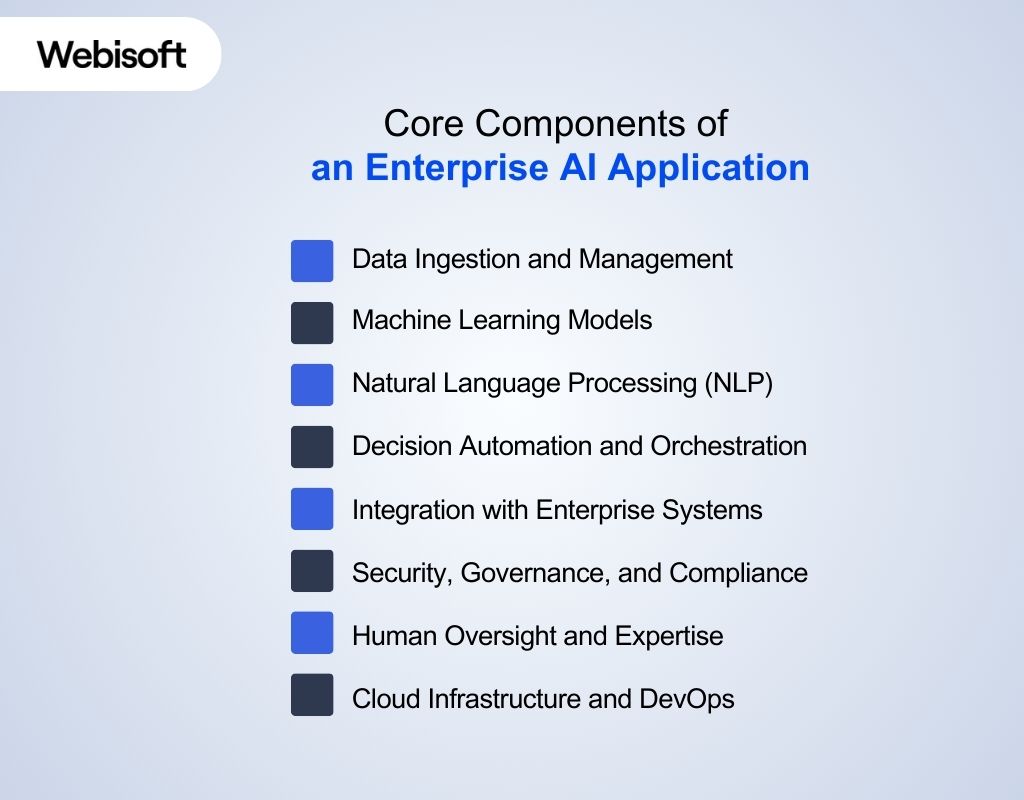 An Enterprise AI application is an end-to-end system that combines data infrastructure, machine learning, automation, and integration to drive intelligent outcomes at scale. Each component plays a vital role in enabling businesses to process complex information, automate decision-making, and continuously optimize performance. Here’s a breakdown of the core components that power a robust enterprise AI solution:
An Enterprise AI application is an end-to-end system that combines data infrastructure, machine learning, automation, and integration to drive intelligent outcomes at scale. Each component plays a vital role in enabling businesses to process complex information, automate decision-making, and continuously optimize performance. Here’s a breakdown of the core components that power a robust enterprise AI solution:
1. Data Ingestion and Management
AI applications begin with data. Enterprises must collect, clean, unify, and manage large volumes of structured and unstructured data from various internal and external sources:
- Data Acquisition: Pulling in information from CRMs, ERPs, IoT devices, APIs, and more.
- Data Cleansing and Preprocessing: Ensuring accuracy and consistency before feeding it into AI models.
- Data Integration: Consolidating disparate systems into a single, actionable data view.
Without quality data, AI outcomes are unreliable. This stage forms the foundation of all downstream intelligence.
2. Machine Learning Models
At the heart of enterprise AI are the models that enable prediction, classification, and pattern recognition:
- Model Development: Building ML, deep learning, or neural network models tailored to specific business problems.
- Training and Optimization: Using historical data to train models, refine accuracy, and minimize bias.
- Model Interpretability: Ensuring transparency by making AI decisions understandable to stakeholders.
- Scalable Deployment: Operationalizing models within real-time enterprise systems at scale.
These models transform raw data into business insights, forecasts, and automation logic.
3. Natural Language Processing (NLP)
NLP powers communication between humans and machines, enabling enterprise AI to:
- Understand voice or text inputs (e.g., emails, chats, documents)
- Generate responses in natural language (e.g., chatbots, report automation)
- Extract key information from unstructured data (e.g., legal contracts, support tickets)
NLP is essential for applications in customer service, HR, legal tech, and internal knowledge management.
4. Decision Automation and Orchestration
AI integration for enterprises goes beyond insights. They automate action through:
- Rule-based and ML-based automation: Triggering processes based on data thresholds or predictions.
- Workflow orchestration: Connecting AI models to real-time enterprise workflows.
- Robotic Process Automation (RPA): Automating repetitive digital tasks across systems and departments.
The real value lies in combining intelligence with action, AI that doesn’t just observe but also executes. Webisoft’s expert RPA service focuses on just this component of the whole ecosystem.
5. Integration with Enterprise Systems
Seamless integration is critical for AI to be functional and scalable across the organization:
- Plug into CRMs, ERPs, HRMS, and data lakes with APIs or middleware.
- Enable data flow and model response in real time within existing business workflows.
- Ensure minimal disruption to legacy infrastructure while adding intelligence layers.
6. Security, Governance, and Compliance
Enterprise-grade AI must meet high standards of control and transparency:
- Data Security: Encryption, access controls, and secure pipelines to prevent breaches.
- AI Governance: Clear policies for model auditing, fairness, and ethical use.
- Regulatory Compliance: Alignment with GDPR, HIPAA, SOC 2, and other industry-specific rules.
Without trust and accountability, AI adoption risks reputational and operational damage.
7. Human Oversight and Expertise
Despite automation, human involvement remains essential:
- AI Training & Supervision: Data scientists and domain experts guide the development process.
- Monitoring & Maintenance: Continuous evaluation of model performance, drift, and errors.
- Feedback Loops: Business users help fine-tune AI behavior and improve decision accuracy.
Enterprise AI is most effective when it’s human-centered and expert-augmented.
8. Cloud Infrastructure and DevOps
Scalability and agility come from the cloud:
- Elastic Compute & Storage: Handling high workloads with dynamic scaling.
- ModelOps & MLOps Pipelines: Streamlined lifecycle management for continuous deployment.
- Cost Efficiency: Optimized infrastructure usage based on real demand.
Cloud-native AI enables faster deployment, experimentation, and innovation cycles.
Benefits of Enterprise AI Application
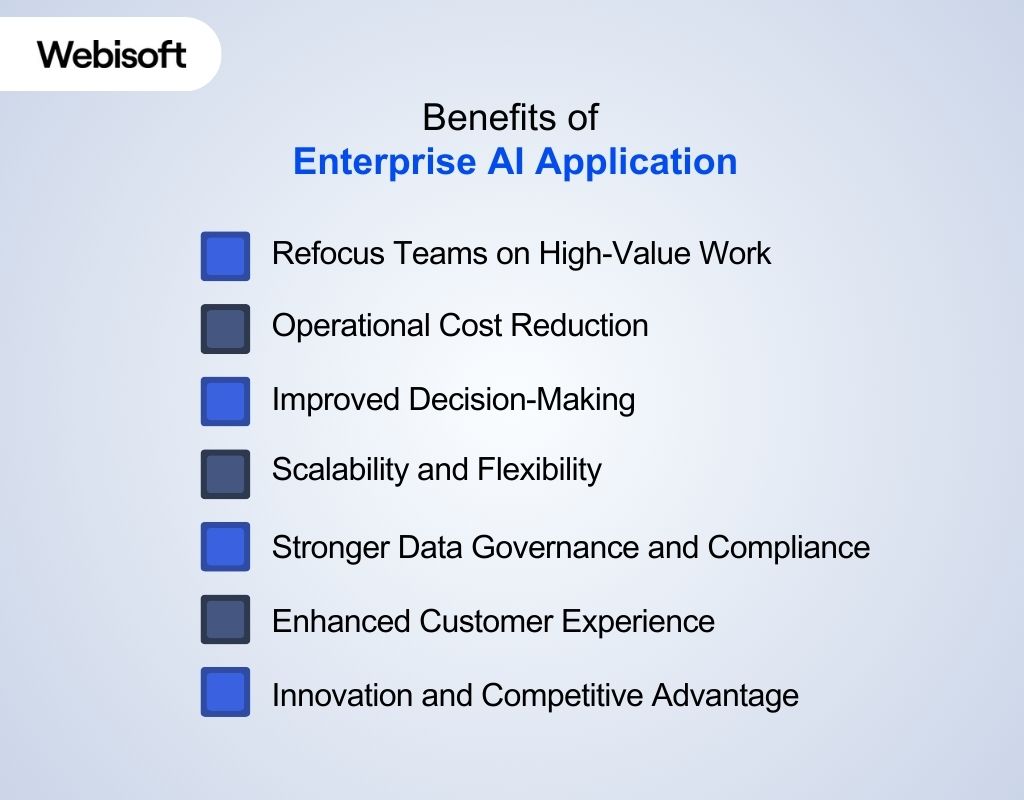 While real-world use cases highlight how AI transforms individual functions, the broader enterprise-wide benefits are what drive large-scale adoption. From productivity and cost savings to compliance and customer satisfaction, enterprise AI applications deliver measurable results.
While real-world use cases highlight how AI transforms individual functions, the broader enterprise-wide benefits are what drive large-scale adoption. From productivity and cost savings to compliance and customer satisfaction, enterprise AI applications deliver measurable results.
1. Refocus Teams on High-Value Work
By automating time-consuming tasks, AI enables employees to focus on strategic work that requires human creativity and judgment. According to McKinsey, up to 30% of tasks in 60% of occupations could be automated. This allows workers to shift toward innovation and problem-solving roles.
2. Operational Cost Reduction
AI significantly lowers operating costs by streamlining business processes and reducing manual inefficiencies. A PwC report estimates that AI could contribute up to $6.6 trillion in increased productivity by 2030, largely driven by automation and efficiency gains.
3. Improved Decision-Making
Enterprise AI analyzes massive datasets to generate actionable insights. Gartner reports that, by 2028, 75% of Enterprise Software Engineers Will Use AI Code Assistants. This will leading to more consistent and data-driven decision-making.
4. Scalability and Flexibility
AI systems scale seamlessly across departments and workloads. With cloud-native platforms, enterprises can rapidly deploy AI applications without overhauling infrastructure. It enable more flexible and scalable adoption.
5. Stronger Data Governance and Compliance
Enterprise AI solutions enforce data policies and support compliance with frameworks like GDPR, HIPAA, and SOC 2. AI can automatically detect anomalies, flag risky behavior, and ensure secure handling of sensitive data. A study by Capgemini found that 77% of organizations see AI as critical to ensuring data accuracy and quality across departments.
6. Enhanced Customer Experience
AI-powered systems personalize interactions and enable 24/7 service delivery. 88% of customers say the experience a company provides is as important as its products or services. AI-driven chatbots and recommendation engines improve response times and engagement while reducing support costs.
7. Innovation and Competitive Advantage
Enterprise AI fuels experimentation and speed to market. Organizations using AI at scale are 1.3x more likely to see revenue growth above the industry average.
Top Enterprise AI Use Cases Across Industries
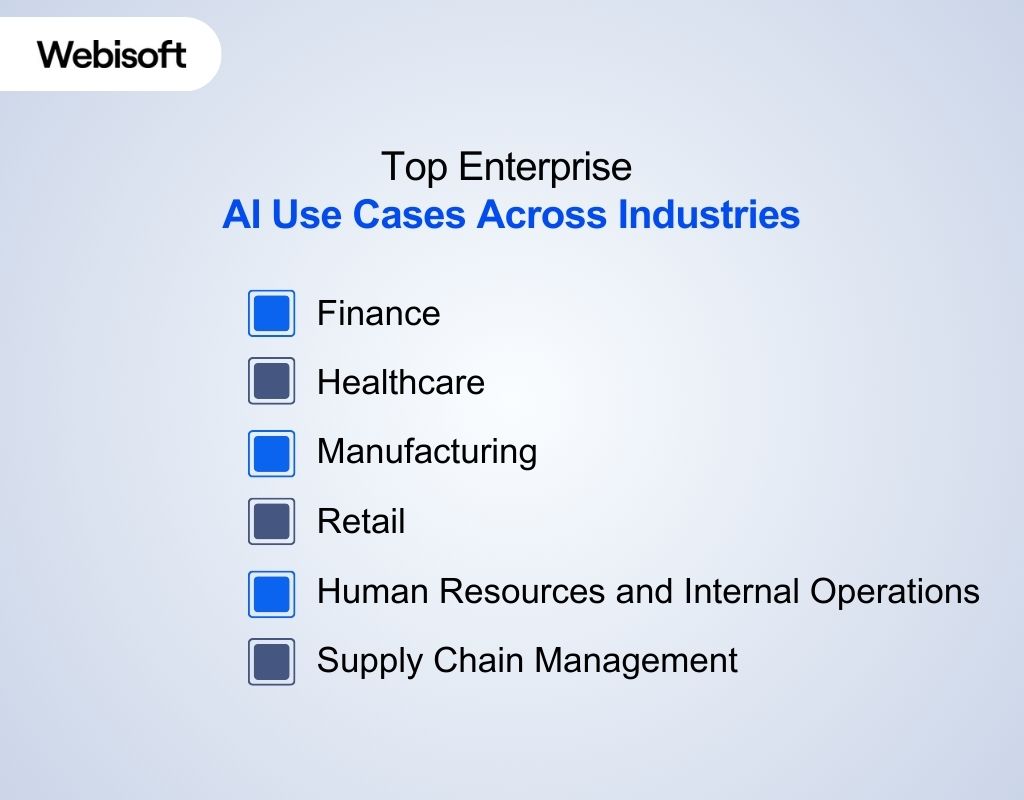 Below are the most impactful enterprise AI use cases across key industries:
Below are the most impactful enterprise AI use cases across key industries:
Finance
In finance, AI analyzes transaction patterns in real time to detect fraud and manage risk with greater precision. Machine learning models identify anomalies that humans or rule-based systems might miss, enabling faster and more accurate fraud prevention.
- Example: HSBC reduced false positives by 60% in its anti-money laundering processes after implementing AI-driven risk modeling and anomaly detection systems.
Healthcare
AI enables faster, more accurate diagnoses, improved medical imaging, and streamlined patient workflows. It supports clinical decisions by analyzing medical data and identifying patterns beyond human capabilities.
- Example: Mayo Clinic uses AI-enhanced imaging to detect early signs of heart disease, improving diagnostic precision and patient outcomes.
Manufacturing
Manufacturers use enterprise AI applications to monitor equipment performance, detect potential failures, and optimize supply chain logistics. Predictive maintenance minimizes downtime, while AI forecasting ensures inventory and delivery systems remain efficient.
- Example: Baxter International saved over 500 machines hours in one facility by deploying AI for predictive maintenance.
Retail
AI enterprise application tailors shopping experiences by analyzing user behavior, purchase history, and inventory data in real time. It also enables dynamic pricing strategies that respond to market demand and competition.
- Example: Amazon reports that AI-powered recommendation systems drive approximately 35% of its total revenue.
Human Resources and Internal Operations
Enterprise AI streamlines internal workflows by automating resume screening, ticket classification, and task routing. This reduces time-to-hire and enhances internal service delivery.
- Example: Unilever uses AI to screen applicants and conduct automated video interviews, reducing hiring time while increasing candidate diversity.
Supply Chain Management
AI brings visibility, predictability, and optimization to supply chains. It forecasts demand, recommends routing strategies, and identifies bottlenecks before they impact operations.
- Example: PepsiCo employs AI to optimize inventory levels and reduce food waste, leading to more sustainable and cost-effective supply chain management.
Challenges in Enterprise AI Application Development
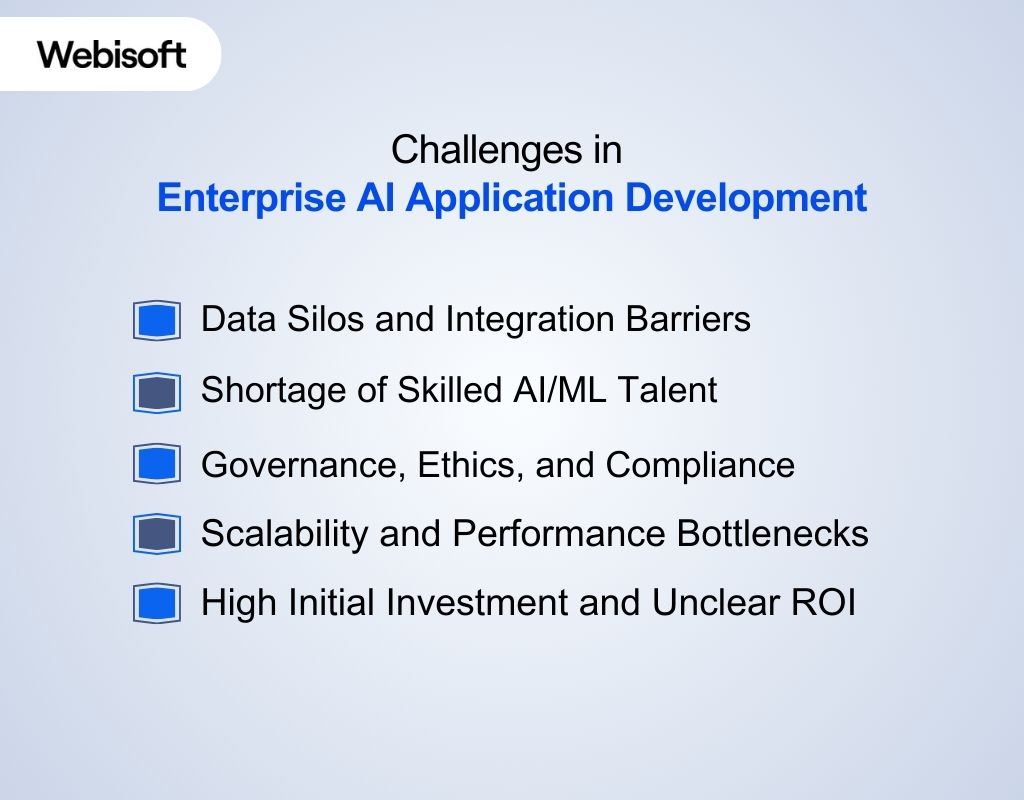 While enterprise AI offers transformative potential, developing and deploying AI applications at scale is complex. Many organizations underestimate the technical, cultural, and operational barriers involved.
While enterprise AI offers transformative potential, developing and deploying AI applications at scale is complex. Many organizations underestimate the technical, cultural, and operational barriers involved.
1. Data Silos and Integration Barriers
Data is the fuel for AI. But in most enterprises, data is scattered across departments, systems, and formats. These silos hinder model accuracy and delay development timelines.
- Challenge: Aggregating clean, relevant, and timely data from CRMs, ERPs, IoT devices, and cloud environments.
- Impact: Incomplete or fragmented data leads to underperforming models and limited business insight.
- Solution: Invest in data engineering, build unified data lakes, and use ETL tools to enable seamless integration.
2. Shortage of Skilled AI/ML Talent
Building AI models and maintaining them in production environments requires specialized skills, data scientists, ML engineers, MLOps professionals, and domain experts. Unfortunately, this talent is in short supply. Hence, hiring AI ML engineers is a challenge for companies.
- Challenge: Hiring and retaining qualified AI engineers, especially in competitive markets.
- Impact: Delays in project delivery, overreliance on third-party vendors, and increased development costs.
- Solution: Upskill internal teams, partner with AI development firms like Webisoft for the best outcome.
Thinking about building an enterprise AI application tailored to your business?
Let Webisoft help you solve real business problems with intelligent, scalable, and secure AI systems.
3. Governance, Ethics, and Compliance
AI systems must adhere to ethical standards, data privacy laws, and industry regulations (e.g., GDPR, HIPAA, SOC 2). Poor governance can result in biased outcomes, legal penalties, and loss of trust.
- Challenge: Establishing transparent and explainable AI systems with audit trails.
- Impact: Legal exposure, brand reputation risk, and regulatory non-compliance.
- Solution: Implement responsible AI frameworks, ensure model explainability, and enforce role-based data access policies.
4. Scalability and Performance Bottlenecks
Pilots may succeed in a controlled environment but fail when scaled across departments or geographies. Issues with real-time inference, latency, and system load can degrade performance.
- Challenge: Scaling AI systems to support large datasets, user loads, and distributed environments.
- Impact: Poor system responsiveness, model drift, and inability to meet business SLAs.
- Solution: Design AI with cloud-native architectures, automate model retraining pipelines (MLOps), and monitor infrastructure continuously.
5. High Initial Investment and Unclear ROI
Enterprise AI application requires upfront investment in infrastructure, talent, tools, and training. But without proper KPIs, organizations struggle to link AI outcomes to business value.
- Challenge: Justifying capital expenditures and managing AI budget overruns.
- Impact: Skepticism from stakeholders and stalled adoption.
- Solution: Start with high-impact, low-risk use cases; measure value continuously; and align AI outcomes with business KPIs.
How Webisoft Helps Build and Scale Enterprise AI Applications
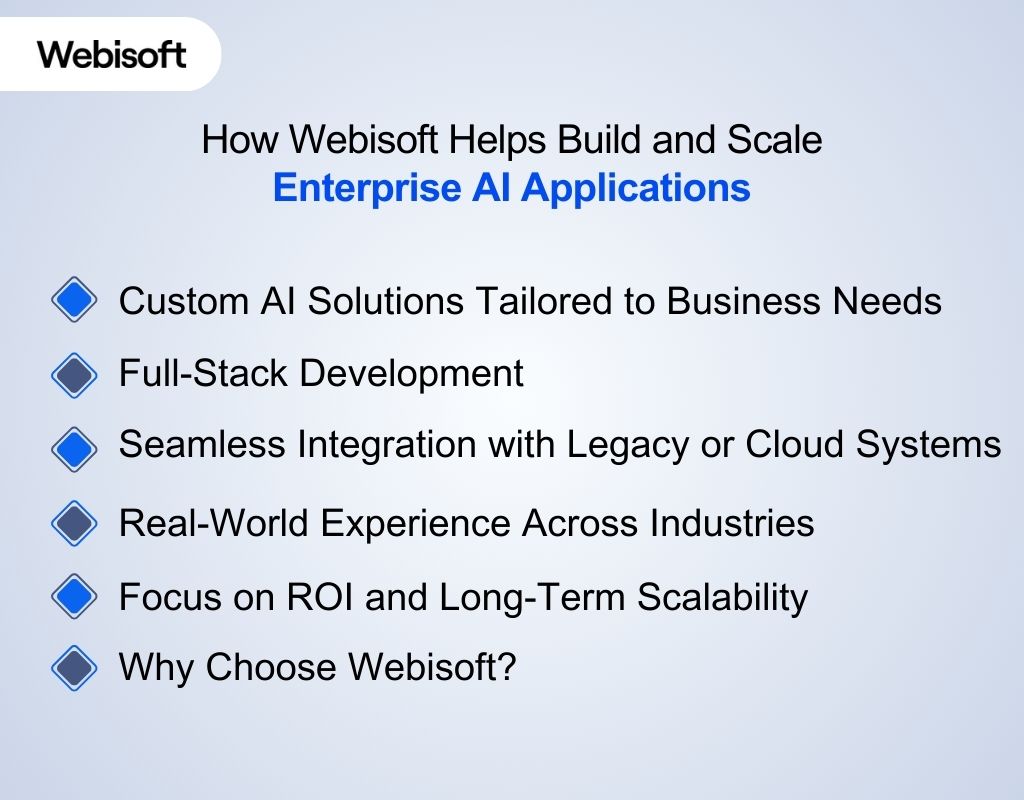 Developing enterprise AI applications requires more than just technical expertise. It demands a deep understanding of business operations, infrastructure constraints, and long-term goals. Webisoft is vastly experienced in both enterprise software development and artificial intelligence development. At Webisoft, we bring together cross-functional AI talent, industry experience, and a product-first mindset to help enterprises design, build, and scale intelligent systems that drive measurable results. Here’s how we do it:
Developing enterprise AI applications requires more than just technical expertise. It demands a deep understanding of business operations, infrastructure constraints, and long-term goals. Webisoft is vastly experienced in both enterprise software development and artificial intelligence development. At Webisoft, we bring together cross-functional AI talent, industry experience, and a product-first mindset to help enterprises design, build, and scale intelligent systems that drive measurable results. Here’s how we do it:
Custom AI Solutions Tailored to Business Needs
Every enterprise has unique workflows, customer journeys, and compliance requirements. That’s why we work closely with your internal stakeholders to design AI solutions tailored to your specific use cases, data maturity, and strategic priorities. Whether it’s automating internal workflows or building intelligent customer-facing tools, we ensure your AI system solves the problems that matter most.
Full-Stack Development
We manage the entire AI lifecycle, from initial discovery and problem framing to model training, backend development, and deployment at scale. Our full-stack team covers data engineering, ML model development, API architecture, cloud infrastructure, and frontend integration. This end-to-end capability eliminates vendor fragmentation and ensures a seamless transition from prototype to production.
Seamless Integration with Legacy or Cloud Systems
Enterprise environments are complex. That’s why we design AI applications that integrate effortlessly with your existing tech stack. We work with CRMs, ERPs, data lakes, and industry-specific platforms to embed AI without disrupting your operations. Our solutions support both RESTful APIs and event-driven architectures, making real-time data exchange and automation frictionless.
Real-World Experience Across Industries
Webisoft has helped companies across finance, healthcare, logistics, retail, and SaaS implement AI at scale. This cross-industry expertise allows us to leverage proven patterns, adapt to industry-specific regulations, and recommend the right AI architectures based on real-world performance.
Focus on ROI and Long-Term Scalability
Being one of the best enterprise AI platforms, our goal isn’t just to launch AI features. It’s to build scalable systems that deliver lasting value. We help you define success metrics, measure performance, and optimize over time. From cost-efficiency and automation gains to revenue growth and competitive advantage, Webisoft ensures your AI investments are aligned with your business goals.
Why Choose Webisoft?
- Agile, cross-functional AI and software teams
- Expertise in MLOps, cloud-native infrastructure, and data pipelines
- Transparent development process with continuous feedback loops
- Commitment to security, compliance, and responsible AI
- Post-launch support and performance monitoring
Final Words
Adopting an enterprise AI application is a necessity for organizations aiming to stay competitive, agile, and efficient. The right solution doesn’t just streamline operations. It enhances decision-making, reduces overhead, and gives your teams the freedom to focus on what truly drives growth. For this, you need the right partner. At Webisoft, we specialize in building and scaling custom enterprise AI applications that align with your goals, integrate with your systems, and deliver long-term impact. Ready to take your enterprise forward? Let’s build something intelligent.
Frequently Asked Questions
How is enterprise AI different from regular AI tools?
Enterprise AI is built for scalability, security, and deep integration with existing business systems like ERPs, CRMs, and data lakes. Unlike consumer AI or basic automation tools, enterprise AI applications are tailored to handle enterprise-level complexity, compliance, and cross-departmental workflows.
How do I integrate AI into my enterprise system?
You’ll need to assess your data infrastructure, define use cases, and choose a suitable AI platform. Then work with a development team to build APIs that connect AI models with your current systems.
Do enterprise AI applications replace human jobs?
Not entirely. They automate repetitive tasks, but most enterprise AI systems work alongside humans to augment decision-making and improve productivity.


